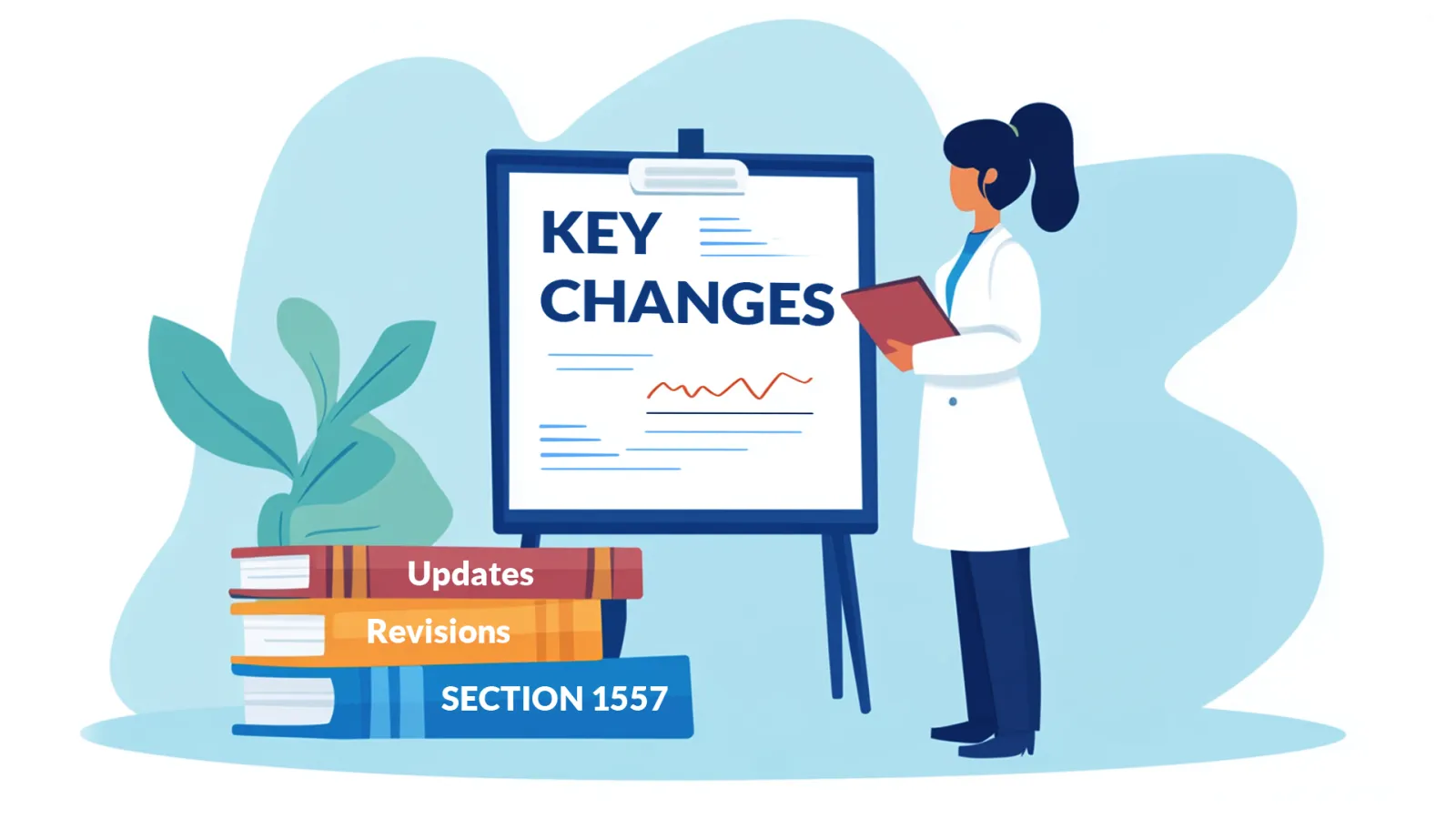The 2024 Final Rule issued by the Department of Health and
Human Services (HHS) reinstates and expands nondiscrimination protections under
Section 1557 of the Affordable Care Act (ACA).
Regulatory updates can sometimes feel overwhelming. Change is difficult. Our dedicated compliance team is researching the Section 1557 updates to save you time, and we're ready to share what you need to know.
This
article will break down the key aspects of the new Section 1557 regulations,
outline the steps you need to take to ensure compliance and address common
questions and concerns. Our aim is to equip you with the knowledge and tools
necessary to navigate these changes confidently and effectively. Let's explore
how these updates will impact your practice and the measures you can take to
stay ahead of the curve.

Why These Updates Matter
HHS published the Final Rule on April 26, 2024, and it is effective July 5, 2024.
The 2024 Final Rule reinstates and expands critical nondiscrimination protections, ensuring that all individuals, regardless of their race, color, national origin, sex, age, or disability, have equal access to healthcare services.
This includes strengthened protections for individuals
with limited English proficiency (LEP), those with disabilities, sexual
orientations, and pregnant individuals.
Who Does It Apply To?
Section 1557 applies to all covered health programs throughout
the United States, including:
- Healthcare providers
- Insurers and grantees.
- Activities offered via telehealth and other services.
The update aims to ensure that all individuals can access healthcare services without discrimination. The rule reinstates and expands
protections against discrimination based on race, color, national origin, sex,
age, or disability.
Key Changes and Requirements

🛡️ Expanded Nondiscrimination Protections: The new rule broadens the definition of sex discrimination to include gender identity and sexual orientation. It also prohibits denial of benefits or coverage based on these protected characteristics.
🤝 Compliance Obligations: To comply with these expanded protections, healthcare entities must update their policies, training programs, and patient intake forms. This includes ensuring effective communication with patients, particularly those with LEP or disabilities.
💬 Language Access: Covered entities must provide timely and accurate language assistance services at no charge and post nondiscrimination notices in the top 15 languages spoken by individuals with LEP in their state.
💁 Section 1557 Coordinator: Organizations with 15 or more employees must designate a Section 1557 Coordinator to oversee compliance with the new regulations.
📝 Notice Requirements: Entities must include nondiscrimination notices and taglines in significant communications and publications, such as patient handbooks and outreach materials.
Acknowledging Court Delays
While some provisions of the new rule have been postponed
due to federal court orders, HCP is committed to keeping you informed and
prepared. We recommend postponing changes to the parts of the regulation that
have been delayed (such as those related to gender identity and sexual
orientation) until the legal challenges are resolved.

More Details about the Section 1557 Injunction:
- A federal court has postponed the effective dates of certain provisions due to some states like Texas and Florida filing lawsuits to challenge the enforcement of the ACA's nondiscrimination protections.
- The plaintiffs argue that enforcing the ACA's nondiscrimination protections related to providing gender-affirming care or coverage for such care violates the Administrative Procedure Act, the First Amendment, and the Religious Freedom Restoration Act.
- Since a federal court made the decision to postpone, this injunction impacts the entire country.
- As a result, all impacted clients should postpone enacting changes to the delayed parts of the regulation.
- HHS/CMS is appealing all cases. Specific court information is available at the bottom of this article: Commonwealth Fund Blog.
How Can HCP Help?
Let's keep it simple. Maintaining your effective compliance program requires our proactive team to monitor these evolving legal changes.
The changes under Section 1557 are reflected within your key workforce training courses.
In addition to updating the Discrimination Policy, HCP has revised the following training sessions for your team, including:
- OIG Compliance Plan
- Compliance for Your Practice
- Corporate Compliance
- Code of Conduct and Compliance Program
- Diversity and Cultural Competency Training
In Summary
The 2024 Final Rule by HHS has provided valuable insights into the reinstated and expanded nondiscrimination protections under Section 1557 of ACA. In this article, you've learned the key aspects of these new regulations, guided you through the necessary steps for compliance, and addressed common questions and concerns.
By understanding these updates and implementing the recommended measures, you're ensuring a discrimination-free healthcare environment and demonstrating a commitment to providing equitable care for all patients. We believe clear communication, cultural sensitivity, and ongoing training are crucial in maintaining compliance and fostering a diverse and inclusive healthcare practice. Remember, our Healthcare Compliance Pros (HCP) team is here to support you every step of the way, ensuring that you stay ahead of the curve and maintain compliance seamlessly.

FAQs about Section 1557:
Client Questions and Responses
[Q:] Do we have to post the nondiscriminatory notice in our office in all 15 languages and then print our office forms (e.g., registration forms, privacy notices, etc.) in each of these languages as well?
[A:] Covered entities, including healthcare providers who receive federal financial assistance, must post a notice of nondiscrimination and taglines in the top 15 languages spoken by individuals with LEP in your state. You are not required to post the nondiscrimination notice in all 15 languages; the notice can be posted in English, as long as you provide taglines (a short statement informing people with LEP that free language assistance services are available) in the top 15 languages of your state.
Client Questions and Responses
[Q:] To clarify, what is considered a significant publication or significant communication.[A:] Here is additional language from the Final Rule regarding "significant communications or publications":
- Targeted to beneficiaries, enrollees, applicants, or members of the public, which may include patient handbooks, outreach publications, or written notices pertaining to rights or benefits or requiring a response from an individual.
- OCR intends to interpret "significant communications and significant publications" broadly.
- OCR aims to maximize covered entities' flexibility, and each covered entity is in the best position to determine which of its communications and publications related to its health programs and activities are significant.
- OCR intends the scope of significant publications and significant communications to include not only documents intended for the public, such as outreach, education, and marketing materials, but also written notices requiring a response from an individual, such as those pertaining to rights or benefits.
(HCP Response) Based on this information, there is room for interpretation regarding OCR's explanation of what constitutes "significant communications or publications." This could include documents such as the NPP and other items required to be given to the patient, as well as new patient materials.
- OCR is not adopting an across-the-board requirement for covered entities to translate certain written documents into a threshold number of languages.
· In our opinion, if you have posted the nondiscrimination notice and taglines in your facility and on your website, and you have a plan to determine what forms/publications require a statement and the top two taglines, then including the statement/top two taglines on future "significant communications or publications" (once older ones have been distributed) will ensure compliance with OCR's requirements.
Client Questions and Responses
[Q:] Do we need to have a Section 1557 Coordinator in our Organization?[A:] Section 1557 Coordinator and designees. A covered entity that employs fifteen or more persons must designate and authorize at least one employee, a "Section 1557 Coordinator," to coordinate the covered entity's compliance with its responsibilities under section 1557 and this part in its health programs and activities, including the investigation of any grievance communicated to it alleging noncompliance with section 1557 or this part or alleging any action that would be prohibited by section 1557 or this part. A covered entity may assign one or more designees to carry out some of these responsibilities as appropriate. However, the Section 1557 Coordinator must retain ultimate oversight to ensure coordination with the covered entity's compliance with this part.
(HCP Response) Based on this information, we believe that if your organization employs fifteen or more workforce members, an individual must be assigned the role of a Section 1557 Coordinator. This may be your compliance officer or other designated individual. These duties include reviewing grievances, record keeping, coordinating the implementation of effective communication procedures, including effective communication with individuals with disabilities, coordinating the implementation of procedures for providing reasonable modifications for individuals with disabilities and implementing training for workforce members.
This information is current as of October 2024.
For more information
My Florida Legal
(https://www.myfloridalegal.com/sites/default/files/2024-05/01-complaint-with-exh.pdf)
HHS News Release
(https://www.hhs.gov/about/news/2024/04/26/hhs-issues-new-rule-strengthen-nondiscrimination-protections-advance-civil-rights-health-care.html)
Litigation Tracker
(https://litigationtracker.law.georgetown.edu/litigation/state-of-florida-et-al-v-u-s-department-of-health-and-human-services-et-al/)
Commonwealth Fund Blog.
(https://www.commonwealthfund.org/blog/2024/new-regulations-counter-discrimination-health-coverage-and-care-are-delayed-courts)
Section 1557 Overview
(https://www.hhs.gov/civil-rights/for-individuals/section-1557/index.html)

